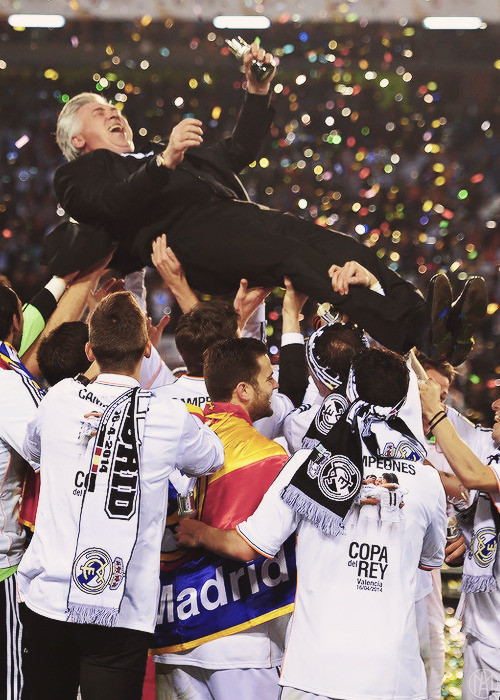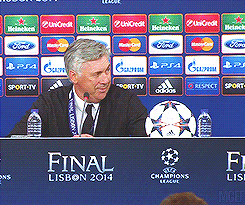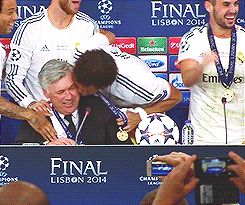Carlo Ancelotti: Cool in the hottest of moments
Carlo Ancelotti: Cool in the hottest of moments

Carlo Ancelotti: Cool in the hottest of moments
On the margins of a blank piece of paper, he would scribble in his starters. He would fill the rest of the page with points about the defence and attack: to maintain possession, to play two-touch football, to bide your time. And he would make copies and hand them out to his players before matches.
Carlo Ancelotti writes all of his notes by hand. He writes in ink. He always wanted to make that human connection. “You can’t write a love letter on a computer,” he writes in his book, The Beautiful Games of an Ordinary Genius. You could say Ancelotti is a bit of a romantic.
Communication is the most important thing. He wants everyone’s opinions. If one of his players is upset, Ancelotti hears them out. He prefers talking to his team instead of shouting; listening instead of ignoring, even when he knows he is right.
“For me,” says the 54-year-old, coach of Real Madrid, “it’s managing people. Managing Ronaldo is the same for me as managing Carvajal or Morata.”
Maybe there’s a reason why his players like to hang out with him, to go out for dinner. Ancelotti once took 50 of his colleagues to a restaurant in the Basque country, as the journalist Simon Kuper recounts in an article in the Financial Times, and Ancelotti paid for the all the meals himself. He likes to say that he is not their father or their brother, but their friend.
Maybe that’s why Ancelotti was able to bring together a group so divided and so damaged just a year ago and win the club’s 10th European Cup. Things were so different under Jose Mourinho. He was more about controlling the information that went in and out of the club, controlling the private lives of the players.
According to the Spanish journalist Diego Torres, who wrote the book, The Special One: The Dark Side of Jose Mourinho, it was Mourinho who suspected the presence of moles in the dressing room. He couldn’t trust anyone. He called his team “sons of bitches.” Mourinho wanted his team to cease any relationship they had with players from Barcelona, to accept their role as bad guys. “You’ve left me all on my own,” Mourinho is quoted as saying. “You’re the most treacherous squad I’ve had in my life. Nothing more than sons of bitches.”
No, not so for Ancelotti. He had a certain belief in his players. He respected the talent they had. Before the Champions League final, Ancelotti said there wasn’t much for him to do. The players didn’t need any motivating: They knew the stage and stakes. La Décima. After all, his starting XI was worth something around €420 million. And they delivered.
After the match, Ancelotti looked cool and unfazed, explaining the victory in the post-match presser, until the his players made that noisy entrance. They danced up and down, and Ancelotti banged along, and Pepe and Sergio Ramos gave him a kiss on the way out. There is real love here.
Ancelotti is almost some kind of football whisperer. He doesn’t make some grand speech to his players or persuade them to do something extraordinary; he simply calms them down and allows them to be the great players they are. It is true that Ancelotti has worked with some of the best talent over his 19 years as a coach – Paolo Maldini, Zinedine Zidane, Didier Drogba, Cristiano Ronaldo – and that it is easier with those kind of leaders, but Ancelotti creates an environment for them to simply be.
Ancelotti treats his players as adults. That’s one thing Nils Liedholm taught him while coaching Ancelotti at AS Roma, but several managers have left an impression on Ancelotti, once a baby-faced midfielder. Arrigo Sacchi taught him respect; Fabio Capello taught him discipline; and Sven-Goran Eriksson taught him to be human. Eriksson would shake the hands of all his players before each training session. Some of them grew tired of the formality, but Eriksson did it anyway.
Ancelotti is all that, and more. The two best coaches were probably his parents, a pair of farmers living in the Emilia-Romagna region of Italy. They taught him patience. They would produce the milk, their main export, “but they never saw the money until the dairy sold the finished cheese,” Ancelotti writes. It would take almost a year. So when we see Ancelotti in the dug-out, barely breaking a sweat, barely reacting to a goal scored, we know he is waiting for something bigger, the grand prize, and that his parents, while they were waiting to be paid, were the first of the Ancelotti family to show their cool and calm.
But Carlo has lost his temper a few times before. (Even then, he’ll go back and ask if he was wrong.) After a match in Bologna, while coaching AC Milan, Ancelotti stormed into the lockers and kicked the door on his way in and slammed the table and broke a bottle. He would even tell a few lies to the journalists. It was all about survival. Then there was the time the legendary referee Pierluigi Collina gave the big coach his first red card. (Ancelotti never really did call Collina an asshole.)
He could have done something drastic at half-time this past weekend. Ancelotti could have gone off. Atletico Madrid were leading after 45 minutes, a header from the defender Diego Godin and a mistake from Iker Casillas costing Real Madrid. But Ancelotti simply told his players to keep going, to keep attacking, that Atletico’s resistance would soon break. It wasn’t really so soon – Sergio Ramos equalized in the 93rd minute – but Ancelotti was the one to reassure them in a moment of doubt.
“He calms both the team and its players,” Paolo Maldini told the Spanish daily Marca. “We’re talking about someone with great knowledge of the game.” And it is true: Ancelotti has won titles in Italy, England, France and, of course, in Europe. He has won the European Cup five times in total. Spain is next to conquer.
Maldini knew from the beginning that Real Madrid would not be patient. Had they lost to Atletico Madrid, perhaps Ancelotti would have lost his job. It is not enough to win: Real Madrid have to play well. They have shown a bit of everything – they went a record eight games without conceding a goal while also scoring 160 goals in all official competitions. They conceded just a single goal in the Copa del Rey, a tournament they eventually won after beating Barcelona. They blew a few of their easier games, but they were spectacular on the counter-attack.
Ancelotti doesn’t impose the same system every where he goes. He assesses his teams and plays to their advantages. He adapts. He is not an authoritarian like Mourinho or defined by a singular style of play like Pep Guardiola. Ancelotti did indeed bring fame to the Christmas Tree: a 4-3-2-1 formation, possession-based football. He used it while coaching Milan, players like Rui Costa, Clarence Seedorf, Andrea Pirlo, Kaka, Andriy Shevchenko, and Filippo Inzaghi all at his disposal.
But when Silvio Berlusconi wanted to see something different, Ancelotti observed and gave in. He knew when to indulge the famous owner of AC Milan. In 2004, Berlusconi ordered Ancelotti to play with two forwards. The coach obeyed, and the team won the Scudetto that year. “With a squad of players like the Milan squad,” said Berlusconi, “I could coach them myself.” Berlusconi would also sit in player meetings, Ancelotti giving the instructions, worrying about this brooding presence.
Ancelotti had a lot to handle there – a meddlesome owner, the pressure of a big club, and a multicultural team, players from France, Italy, the Netherlands, both black and white. Before that, he was coaching Juventus, and the ultras called him “pig-face.” The media there questioned his job security before many matches. After that, there was Roman Abramovich at Chelsea, and the time Ancelotti was fired inside the bowels of Goodison Park. No wonder his ass is “earthquake-proof.” He was ready and prepared for the Real Madrid job.
“He’s used to being at winning clubs,” Maldini says, “ones that want to play good football and be successful. He showed that in England, Italy and France, and not many managers can say that. There isn’t a single team that Carlo couldn’t manage.”
Madrid president Florentino Perez wanted Ancelotti for a long time. He first tried in 2006. Ancelotti, like Andrea Pirlo, would have left right there and then for Real Madrid. Milan said no. Then Ancelotti had secret meetings with Chelsea. He was always a man in demand.
It is not that he is a master tactician. He can be shrewd – he brought on Marcelo and Isco midway through the final in Portugal, and they helped to change the game. And Ancelotti can make mistakes – he once mistook Real Sociedad for Real Zaragoza, a club relegated a year earlier. He is not even considered one of the top two managers in the game. That’s Mourinho and Guardiola. If Mourinho is the antagonist, and Pep Guardiola is the protagonist, then Carlo Ancelotti is the best supporting actor. Ancelotti does his job best when he’s not in the spotlight, when he’s with everyone else, not on his own.
“He holds in all his worries and pressures,” writes Maldini in the forward of Ancelotti’s book, “and so the team preserves its tranquility. There’s no need to be the Special One, Two or Three to win. It’s enough to have an inner equilibrium and to stay out of the limelight, to keep from setting off fireworks in front of television cameras.”
Above all, Ancelotti is simple. He loves life. He jokes, and he enjoys eating back home in Emilia-Romagna. Tortellini, pork and a glass of wine – the meal of a real champion.
This piece was written by Anthony Lopopolo, a Senior Writer for AFR. Comments below please.









